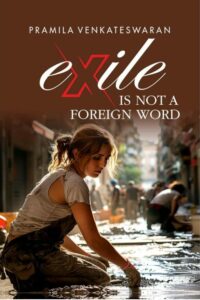 Review by Megha Sood
Review by Megha Sood
Pramila Venkateswaran, Poet Laureate Emerita of Suffolk County and author of multiple poetry collections, brings forth her latest poetry collection of fifty-one poems, Exile is Not a Foreign Word, which introspects the walls—both figuratively and metaphorically—that are divisive in nature in terms of religion, caste, color, creed, and make us poor in more ways than one. Her deep meditation on issues plaguing the world, along with brilliant life introspection through poetry, gives birth to this riveting collection. She delves into the social issues as she ruminates on the damage done by divisive rhetoric, injustice, and exploitation in these nimble, genuinely felt poems.
The poignant collection is divided into three sections, namely “Walls”, “Frames”, and “Rungs”. In the opening section of “Walls ”, Pramila brings out the perspective of being a witness to the atrocities from a privileged stance, where the walls drawn around us in terms of literal and figurative borders prevent us from empathizing with our fellow human beings. Her poems are a war cry and an elegy rolled together.
Pramila talks about solidarity when humanity propagates through waves of social injustice. The profundity of the emotions is evocatively captured in the following lines.
I am unnerved by the thought that I can be
violent towards the ones I don’t recognize,
who are different. (4)
These invisible walls are built with oppressive cultural norms and accumulated hatred: ethnicity, race, gender, religion, wealth, and poverty. The poet offers a war cry, urging the readers to pay attention to the divisive walls ripping us apart.
Do walls have eyes and ears? Do walls talk?
What do they say? Do they shout, flex their muscles?
Do walls erode, lose stones, crumble? (6)
The poems are written in many different voices— most of them women—as laments, as confessions, as angry outbursts against the destruction of humanity and cultures.
The deft poetic brilliance coupled with the sensitivity of an immigrant poet is beautifully expressed through various poems in the collection. Several poems in the collection reveal the poet’s masterful command of craft, distinguishing the poetic from the pedestrian.
Pramila highlights the current state of humanity that is inundated with fake news that makes the collective decision ineffective and flawed, simultaneously drawing our attention towards freedom and thought censorship. The poet quotes German-born American political theorist and philosopher Hannah Arendt, known for her influential writings on totalitarianism, regarding the desensitization of people to the dictatorship.
Hannah Arendt says we don’t learn from our past.
We are condemned to repeat it, unless
we believe in collective responsibility. (13)
The second section of the book “Frames” spotlights and juxtaposes the human conditions as it bears witness to war, crisis, suffering, protest, and voices dissenting from different time periods in history—each moment framed for readers’ attention.
A history left unframed undermines our capacity to distinguish between what is accurate and what is false, hence establishing the poverty in our visions, an emotion beautifully expressed in the lines-” Walls are our poverty. They gouge out the ground of our seeing”. (27)
Pramila captures a myriad of emotions ranging from the grief of people in Gaza, to casteism, to the tribulations of the indigenous population, to the dark reality of 5000-year-old cast brutality and sexual predation of Dalit women under the auspices of god in temples. She offers the sense of helplessness intermixed with complicity in the war, through the lines —” Where is the switch to disable the wires of a diabolical army without conscience”(63).
Through poems like “Looking for a Rung” and “Woman Question,” she poses several questions to her female readers about the patriarchal structures that have subjugated them for generations.
Don’t ask
Do as your told
but when she rolls away
she’s a question mark nagging others (65)
One can almost feel the nostalgia and sense of belonging of an immigrant poet in the poem “History of My Suitcase”. The line tugs at the reader’s heart—” When I was homesick, I buried my head into my suitcase to breathe in nostalgia peppered with burned grit “(68).
The tail end of the collection, with its section “Rungs,” conveys the message of strength, hope, and resilience among countless trials and tribulations through its various evocative lines, such as “and you will listen, for there is no wall stopping you from listening. There is nothing to stop you” (86)
The lyrical exposition of these poems urges the reader and offers a deep introspection in a world that is laced with persistent grief, war, and divisive, toxic political structures.
Exile is not a Foreign Word by Pramila Vankateswaran
Copper Coin Publishing, 2024, Page 104, Paper, ₹399
ISBN Number: 9788197446412
Megha Sood( She/her) is an award-winning Asian-American author, poet, editor, and literary activist from New Jersey. A Literary Partner with “Life in Quarantine” at Stanford University. Her four poetry collections include the award-winning (My Body Lives Like a Threat, FlowerSong Press). She has received support from VONA, Pen Women, Sundress, Dodge Foundation, Kundiman, and Martha’s Vineyard Institute. Her creative works were sent to the moon in 2025 in collaboration with NASA. Link: https://linktr.ee/meghasood
